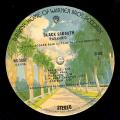 That damn internet!" The lawsuits continue to fly. Everyday people are being dragged into court. Some lose - and end up thousands in debt to a record company. What began with Napster, soon exploded to Kazaa, Morpheus, Limewire and the like. Record companies had themselves convinced these services were the reason profits are down. They were wrong.
That damn internet!" The lawsuits continue to fly. Everyday people are being dragged into court. Some lose - and end up thousands in debt to a record company. What began with Napster, soon exploded to Kazaa, Morpheus, Limewire and the like. Record companies had themselves convinced these services were the reason profits are down. They were wrong.Gallup polls of music buyers (those under 30 years old) revealed something interesting. The question was "Why don't you buy as many CD's as you used to?" The expected response: "I download 'em for free!" The answer they gave: "Music today sucks!" What? The internet isn't the scapegoat? File sharing isn't cutting into profits the way we thought it was? Nope. Music today sucks.
I've been on the frontlines of the music business for three decades. I'm the guy that played the songs on the radio - you decided to buy in stores. Radio made these songs hits. The repetition of hearing them over and over made you like them. It's that simple. It used to be that "Hit Radio" (the format that drives the most record sales) was mass appeal. You could listen to your local Top 40 station and hear music that appealed to listeners 12 to 50. This trend continued well into the 80's. But, there was a point a few years back when "Hit Radio" changed. The music they played became less mass appeal. It became rhythmic. It became rap. It turned raunchy. Suddenly stations that appealed to everyone - began to appeal to just the young. The really young. It seems Hit Radio today appeals to those under 20. It's not that they don't play good songs now & then - it's that they mix in this rhythmic, rap, raunchy crap. This is precisely why people in the survey said "Music today sucks!" Those vocal 20 to 30's made their opinion known. We can conclude most CD sales today are being made to this under 20 crowd by the music being played on Hit Music stations. It's a viscous cycle. Record Company profits are down. They release more product for those that are still buying CD's (under 20's) - and the rest of us lament, "Music today sucks."
RELEASE BETTER MUSIC. It's out there. Bands and songs have yet to be discovered. There are radio stations that cater to older demographics - but we don't buy CD's do we. My radio program is thriving - maybe because some of the music I play is up to 35 years old. My audience would agree that "Music today sucks."

.jpg)





4 comments:
Thank you Brian for posting this! Rap/Hip Hop gives me a headache and you can't make out half of what's being sung but rest of the crud thats out there.
I was a fan of WDBR until they changed their format and got tired of listing to what they pass for music. A few years ago I started channel surfing and hit WNNS during an 80's run ... Ahhh! Music at last! I've been a hardcore fan ever since -- and now that you have the 70's lunch ..
Well, you won't be getting rid of a listener if you keep up the good work.
This is a brilliant post Brian. You hit the nail on the head. Your music mix obviously doesn't draw the under 20 crowd. Thank God.
Thank You WNNS and Brian and Kellie...you guys make my morning and lunch! Why us non 20 older geration don't even call it music what they are playing on other stations!
EMI music boss: “The CD is dead”
The CEO & chairman of EMI Music, Alain Levy told an audience at the London Business School on Friday that the CD as we know it is dead.
According to Levy, record companies won’t be able to market CDs any longer without including ‘value added material’ and will have to make CDs a more attractive purchase to the consumer. “We have to be much more innovative in the way we sell physical content,” he said.
Levy noted that physical media still has a place, but it isn’t going to have it for very long.
Post a Comment